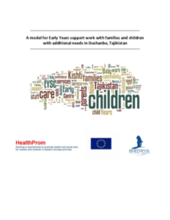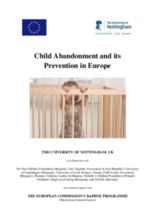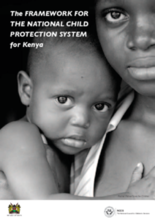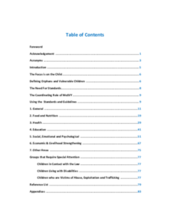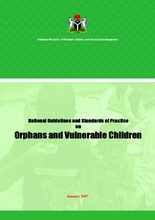Displaying 211 - 220 of 365
SOS Children's Villages has produced an assessment tool for the implementation of the UN Guidelines for the Alternative Care of Children. It has been designed to support the advocacy activities of SOS Children's Villages. The tool’s main focus is to measure a state’s obligations under the UNCRC, in providing quality care arrangements for all children who have lost parental care and those families at risk of separation
This qualitative research study seeks to better understand some of the reasons for residential care expansion in the province of Battambang, Cambodia. The study aims to identify why children are sent to orphanages and understand the attitudes of those stakeholders who are influencing the rise in institutions in the province.
This report is the result 4 of a two-year EU funded project “An Early Years Support Centre (EYSC) service in Dushanbe: Reducing poverty, empowering vulnerable families, strengthening partnerships and advocating for rights”. It outlines the model of support that was developed through the EYSC project in Dushanbe, the capital of Tajikistan.
This comprehensive manual provides an overview of child abandonment and its prevention in Europe, exploring the extent of child abandonment, possible reasons behind this phenomenon, the consequences of abandonment, and good practices in terms of prevention. For the purposes of the EU Daphne-funded project, child abandonment is defined in two ways, namely open and secret abandonment. Country specific in-depth reviews of child abandonment and its prevention are provided for 10 countries and results from an EU-wide survey analyzed.
This document contains the national framework for the child protection system in Kenya, developed with the intention of improving linkages between different sectors for more a more coordinated approach to protecting children.
In order to commemorate the two year anniversary of the resolution of the Alternative Care Guidelines, discuss the use and implementation of the Guidelines, and raise the profile of the importance of this international framework, the Permanent Mission of Brazil to the United Nations, in partnership with the Better Care Network, UNICEF, SOS and the NGO Committee on UNICEF Working Group on Children without Parental Care, held side-event during the UN Social, Humanitarian Cultural Affairs Committee of the UN General Assembly.
This Prakas is intended to define roles and responsibilities of relevant competent agencies and establish procedures, operational guides, and forms to implement the Policy on Alternative Care for Children.
This study commissioned by the Ministry of Gender, Children, and Community Development and financially and technically supported by UNICEF and the Better Care Network, describes the situation of children in institutional care in Malawi.
This document provides minimum standards and guidelines for service providers who work with orphans and vulnerable children (OVC) in Cambodia.
Guidelines developed to assure and improve the quality of services for the well being, protection and development of orphans and vulnerable children in Nigeria



